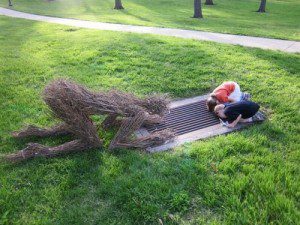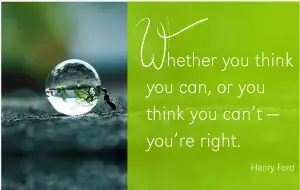By Katrin Geist
Guest Writer for Wake Up World
I watched this inspiring video recently and thought to share it. It is the story of 1) how suggestion can lead to wrongfully accepting someone else’s verdict as true (and living accordingly), and 2) how finding inspiration may change your life in an amazingly beautiful, ‘impossible’ way.
Arthur Boorman was a disabled veteran of the Gulf War for 15 years, and was told by his doctors that he would never be able to walk on his own, ever again… He stumbled upon an article about Diamond Dallas Page doing Yoga and decided to give it a try… Even though doctors told him walking would never happen, Arthur was persistent. He fell many times, but kept going… getting stronger rapidly, and he was losing weight at an incredible rate!
You can watch the 5 minute video of his amazing transformation below.
Arthur’s experience illustrates what happens when we listen to other people’s opinion and, unquestioning, turn it into a living fact. We all do it to varying degrees. But we can easily regain the power of decision in our lives. It is not only personally liberating, but also opens the doorways of perception in realizing that nobody outside ourselves really holds any power over us – unless we give it to them.
The Power of Suggestion
The power of suggestion has been long known. It’s a great tool to help yourself or someone else – if applied correctly.
Suggestion equally works in both ways, constructive and destructive. The difference lies in the intention of the person suggesting, as well as in the perception of the person receiving. In Arthur’s case, he believed what doctors told him for 15 long years. And of course, he is not alone in this.
The tragedy is that those doctors were likely well-meaning, only going about it in the most unfortunate way. Why?
I believe that feeling obliged to tell patients ‘the truth’ creates unwanted obstacles for people. What good is a piece of information that says: “You have two weeks to live”; “You’ll never walk again”; “You’ll remain incapacitated for the rest of your life”, and so forth? Would it not be far better to say: “Medically, we have done everything we can for you – but there is a multitude of other options, such as __,___, and___”? This tells patients the current medical truth while empowering them with new choices, instead of leaving people hopeless with nothing left to try.
Remember, when a system of reference (like medicine) is exhausted, it only means the end of the system – not the person.
Our medical system is but one of many approaches to healing. There are always other options. Of course, that requires doctors to educate themselves about viable alternatives and to share these with the people in their care. While some MDs refuse, others thankfully already practice this, and successfully.
 Conversations at the doctor’s office are highly suggestive: after all, we’re going to see an expert to learn about the state of our bodily affairs. We believe what they tell us. Wise doctors use suggestion to engage the placebo effect, which is hardly applied enough, yet I dare say that it is one of the best ways in which to heal, period. The placebo is nothing less than the body’s innate applied capacity to heal itself. Whoever engages it renders another an excellent service indeed. And the opposite also exists: a nocebo effect, where people get ill through the mere power of suggestion and belief that something is terribly wrong with their health. People can literally worry themselves sick.
Conversations at the doctor’s office are highly suggestive: after all, we’re going to see an expert to learn about the state of our bodily affairs. We believe what they tell us. Wise doctors use suggestion to engage the placebo effect, which is hardly applied enough, yet I dare say that it is one of the best ways in which to heal, period. The placebo is nothing less than the body’s innate applied capacity to heal itself. Whoever engages it renders another an excellent service indeed. And the opposite also exists: a nocebo effect, where people get ill through the mere power of suggestion and belief that something is terribly wrong with their health. People can literally worry themselves sick.
(For more information, please read the article How Fear Makes You Sick by Dr. Lissa Rankin MD)
Asking the Right Questions
In order to avoid worrying yourself sick, or an experience like Arthur’s 15 year-long detour: as a rule of thumb, when someone suggests something to you – p a u s e . Ask yourself: “Does this belief serve me?” If it does, keep it. If it does not, replace it with something you prefer. This, believe it or not, works. With a bit of practice, you’ll get very good at picking and choosing thoughts to sponsor, and thoughts to discard.
One can design their own belief systems in this way. It is very liberating, and you see much clearer all around: you learn how changeable everything really is, and that a flexible belief system is much more fun and powerful to entertain than a rigid one, which can imprison.
What’s a belief? A thought you keep on thinking. This is why daily affirmations work, even though they may feel fake at first. If you persist with repeating a new thought over and over, it’ll eventually feel familiar and your acceptance of it deepens as it turns into a belief you hold as true. This reprograms your subconscious mind with a self-chosen, much healthier belief the body then carries out. Yes, that’s right: any belief comes with a specific biochemistry attached. People who are habitually angry poison themselves inside, for example. Fostering positive beliefs in your life goes way beyond ‘positive thinking’. (Please note that changing your BS is different from experiencing denial about something.)
Two more things that spontaneously come to mind here:
1) Who is your truth provider? In other words, where your beliefs originate from? This needn’t be tedious work – you might immediately hear a parent’s or teacher’s voice… most of our beliefs do not stem from our own choices and conclusions. We took them on very early in life. Until you learn to question them, you may well get to 80 and still be 15 years of age inside – your basic conditioning has not changed in decades. The good news is that you can break this cycle at any time. Having the desire to do so is a good indicator that you’re expanding, outgrowing an old, outdated belief system that doesn’t serve you any longer.
2) Dr. Joe Dispenza’s great book “Breaking the habit of being yourself” may be helpful to you, if the subjects of ‘mind power’ and personal transformation interest you. You can read about it here.
A Final “Suggestion”…
I think the world needs inspiring stories like Arthur’s, perhaps now more than ever. And while practising yoga brought Arthur his life back, his true breakthrough was finding the inspiration to begin – and more importantly – to continue on that journey of rebuilding his body, and discovering yoga as a gradual path to recovery. Arthur’s story is a beautiful journey of courage, belief in oneself, determination, and self-healing. It is possible for all of us.
Whichever path you choose, I wish you exciting discoveries along the way, and the knowing that you can, indeed, heal and live happily ever after. Arthur went from having given up to creating a new lease on life. So can you!
About the author:
Katrin Geist, BA, MSc, combines her interests in consciousness, personal transformation, and natural healthcare as Reconnective Healing practitioner, speaker, and author. Her monthly “Healthy Living Newsletter” offers original articles like this one on relevant natural healthcare topics.
Katrin has held international Reconnective Healing clinics in several countries and currently works from her New Zealand office in Dunedin. To contact her for personal or remote sessions, send an email to [email protected], or call 0064 (0)21 026 95 806 NZ mobile).
Katrin’s website and blog at HolisticHealthGlobal.co.nz also offer more information on Reconnective Healing and how it helps people regain and retain their wellbeing – naturally and effortlessly: no pills, no needles, no side-effects. Trying this process may well be the best thing you ever did! No more than 3 sessions required to find out what difference this may make for you.
- Website: HolisticHealthGlobal.co.nz
- Facebook: Holistic Health Global Ltd
- Email: [email protected]
- Phone: 0064 (0)21 026 95 806 (NZ mobile)

If you've ever found value in our articles, we'd greatly appreciate your support by purchasing Mindful Meditation Techniques for Kids - A Practical Guide for Adults to Empower Kids with the Gift of Inner Peace and Resilience for Life.
In the spirit of mindfulness, we encourage you to choose the paperback version. Delve into its pages away from screen glare and notifications, allowing yourself to fully immerse in the transformative practices within. The physical book enriches the learning process and serves as a tangible commitment to mindfulness, easily shared among family and friends.
Over the past few years, Wake Up World has faced significant online censorship, impacting our financial ability to stay online. Instead of soliciting donations, we're exploring win-win solutions with our readers to remain financially viable. Moving into book publishing, we hope to secure ongoing funds to continue our mission. With over 8,500 articles published in the past 13 years, we are committed to keeping our content free and accessible to everyone, without resorting to a paywall.








